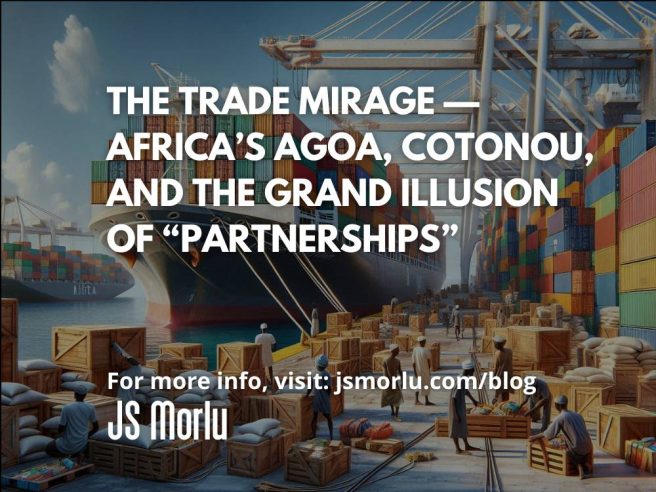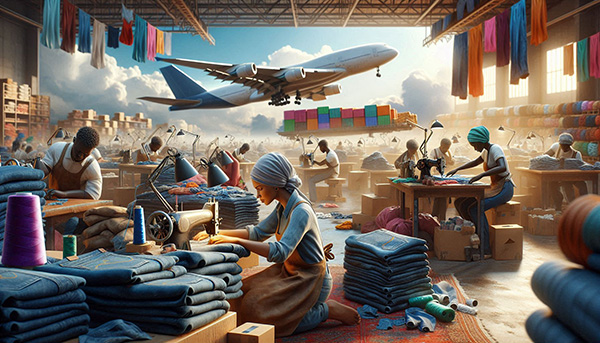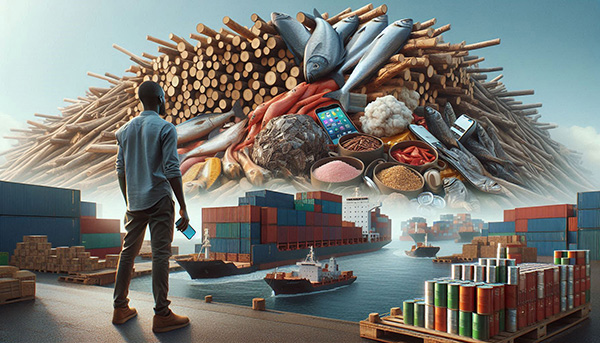By: John S. Morlu II, CPA
The Great Theater of Trade Agreements
Every decade, a new act begins in the global theater of trade diplomacy. Someone in a well-ironed suit — usually in Washington, Brussels, or Beijing — steps up to a podium decorated with flags, declares “Africa Rising,” and promises inclusive trade and prosperity for all. Cameras flash. Delegates clap. There’s free champagne.
Then everyone goes home — except Africa, which stays behind to pay the bill.
From the African Growth and Opportunity Act (AGOA) to the EU’s Cotonou Agreement, to the countless bilateral trade deals between African nations and G20 countries, the continent looks like the most loved partner in global economics. Everyone’s signing something with Africa — the U.S., the EU, China, Turkey, India, Japan — it’s like the most popular kid at prom. Except this kid brings the food, sets up the music, and still goes home hungry.
It’s the world’s most tragic punchline: a continent that exports diamonds, gold, cobalt, and timber, yet imports toothpicks, wigs, and tomato paste.
AGOA: The American Gift That Keeps On… Limiting
When AGOA was signed in 2000, U.S. officials promised a new era of “African export opportunity.” Duty-free access to the world’s biggest market! The headlines screamed: Africa, welcome to capitalism!
But there’s fine print. AGOA isn’t permanent. It’s a “renewable act,” like a Netflix subscription the U.S. can cancel anytime — especially if your country suddenly elects a leader who says things like, “We’d like to process our own oil.”
For two decades, African countries have exported oil, textiles, and agricultural goods under AGOA. Translation: they’ve been shipping the same stuff since the 1970s, only this time duty-free. The U.S. exports back airplanes, tractors, software, pharmaceuticals, and self-help books on “How to Succeed in Business Without Resources.”
In one Kenyan textile factory tour, a worker told a journalist:
“We make jeans for Americans. But none of us can afford to wear one.”
AGOA sounds noble — “growth and opportunity” — but if you peel the acronym, it’s basically “Another Gift of Asymmetry.”
The Cotonou Accord: Europe’s Noble Trade Sermon
The Cotonou Agreement — signed in 2000 between the EU and the African, Caribbean, and Pacific (ACP) countries — was sold as a “partnership of equals.” It even begins with romantic phrases like shared values and common destiny. You’d think it was a dating profile.
But anyone who’s ever dated a manipulative ex knows that “shared values” often means “you’ll share, I’ll value.”
The Cotonou framework promised to promote sustainable development and good governance. In practice, it often meant Europe exporting laws and products, and Africa exporting compliance and raw cocoa.
Fun fact: Europe buys Africa’s cocoa for $2,000 a ton and sells back chocolate worth $30,000 a ton. The profit margin is so sweet even Willy Wonka would file for a trade license.
Meanwhile, the rules of origin, technical standards, and quality certifications are so tight that a local African factory needs more paperwork to export soap than it takes to launch a SpaceX rocket.
Europe gives lectures about democracy and fair trade — but only after Africa finishes unloading the containers of raw materials.
It’s the longest-running colonial musical, just with better costumes and a “partnership” label.
Bilateral Deals: Tailored Partnerships, One Size Fits All
Every G20 country has a “special” deal with Africa. They all start with words like “strategic cooperation” or “win-win.” But the fine print always reads like this:
- Africa: exports raw materials.
- Partner country: exports finished goods, advisors, and PowerPoint presentations.
China comes bearing infrastructure — roads, bridges, stadiums — but conveniently, most of them lead directly to the mines.
India buys Africa’s oil and sells back refined petrol — sometimes at twice the price.
Turkey sells cement and tiles to countries sitting on limestone.
America funds entrepreneurship programs that require Microsoft subscriptions.
And everyone smiles for the photo op.
Even Africa’s own trade pact, the AfCFTA, risks turning into an internal shipping service for foreign brands. Because let’s face it: you can’t trade what you don’t produce.
A customs officer in Accra once joked, “We import more containers than we produce excuses for it.”
The Great Paradox: The Consuming Continent
Africa is the most resource-rich but import-dependent region on Earth. It’s like owning a gold mine and borrowing money to buy jewelry.
It exports raw fish from its waters, raw logs from its forests, and raw minerals from its soil — then imports tuna cans, mahogany furniture, and smartphones made from the same materials.
Here’s a fun economic riddle:
Q: What’s Africa’s number one export?
A: Hope. (Usually in containers labeled “raw materials.”)
Africa doesn’t just import products. It imports identities. Imported fashion, imported religion, imported systems of government, even imported motivational quotes. Meanwhile, the youth are told to “be job creators” — in economies that can’t even produce toothpicks without an import license.
At this rate, if Africa discovered oxygen, someone would find a way to bottle it and sell it back.
The Historical Echo
Colonial trade was simple: extract and export. Post-colonial trade is sophisticated: extract, export, and call it “development.”
Back then, colonizers came with whips and gunboats. Now, they arrive with Excel sheets, “partnership frameworks,” and PowerPoint slides titled Sustainable Growth Pathways. The vocabulary evolved, but the direction of value stayed the same — outward.
A professor once summarized it perfectly:
“Before independence, Africa exported raw materials. After independence, it exported them more efficiently.”
And yes, it’s working — just not for Africa.
The Way Out — Or Still In?
The solution isn’t another summit with finger sandwiches and press statements. It’s industrialization with backbone — manufacturing, refining, branding, and owning the means of production.
Africa must learn the oldest trick in the capitalist book: sell finished goods. Let’s keep the cocoa until there’s a chocolate bar named “Nkrumah Delight.” Let’s refine the cobalt before Tesla calls. Let’s can the tuna before it swims to Europe.
It’s not rocket science — it’s common sense. But common sense is rare in trade policy, where officials still fly business class to sign deals that keep their countries broke.
Until then, Africa remains the world’s biggest open-air supermarket — stocked by nature, managed by foreigners, and patrolled by economists with PowerPoints.
Epilogue: The Polite Exploitation
Trade, they say, is about mutual benefit. But somehow, the mutual part always involves Africa exporting and someone else importing the profit.
AGOA, Cotonou, bilateral pacts — all shiny wrappers on the same old candy. It’s elegant exploitation, wrapped in diplomatic vocabulary.
Africa’s tragedy is not lack of resources — it’s lack of transformation. It keeps selling the raw story, never the final chapter.
So next time someone says, “Africa is open for business,” maybe reply:
“Yes, but who owns the shop?”
Because in this global bazaar, Africa isn’t yet a merchant — it’s the merchandise, beautifully packaged, eternally undervalued, and always on sale.
Author: John S. Morlu II, CPA is the CEO and Chief Strategist of JS Morlu, leads a globally recognized public accounting and management consultancy firm. Under his visionary leadership, JS Morlu has become a pioneer in developing cutting-edge technologies across B2B, B2C, P2P, and B2G verticals. The firm’s groundbreaking innovations include AI-powered reconciliation software (ReckSoft.com) and advanced cloud accounting solutions (FinovatePro.com), setting new industry standards for efficiency, accuracy, and technological excellence.
JS Morlu LLC is a top-tier accounting firm based in Woodbridge, Virginia, with a team of highly experienced and qualified CPAs and business advisors. We are dedicated to providing comprehensive accounting, tax, and business advisory services to clients throughout the Washington, D.C. Metro Area and the surrounding regions. With over a decade of experience, we have cultivated a deep understanding of our clients’ needs and aspirations. We recognize that our clients seek more than just value-added accounting services; they seek a trusted partner who can guide them towards achieving their business goals and personal financial well-being.
Talk to us || What our clients says about us



